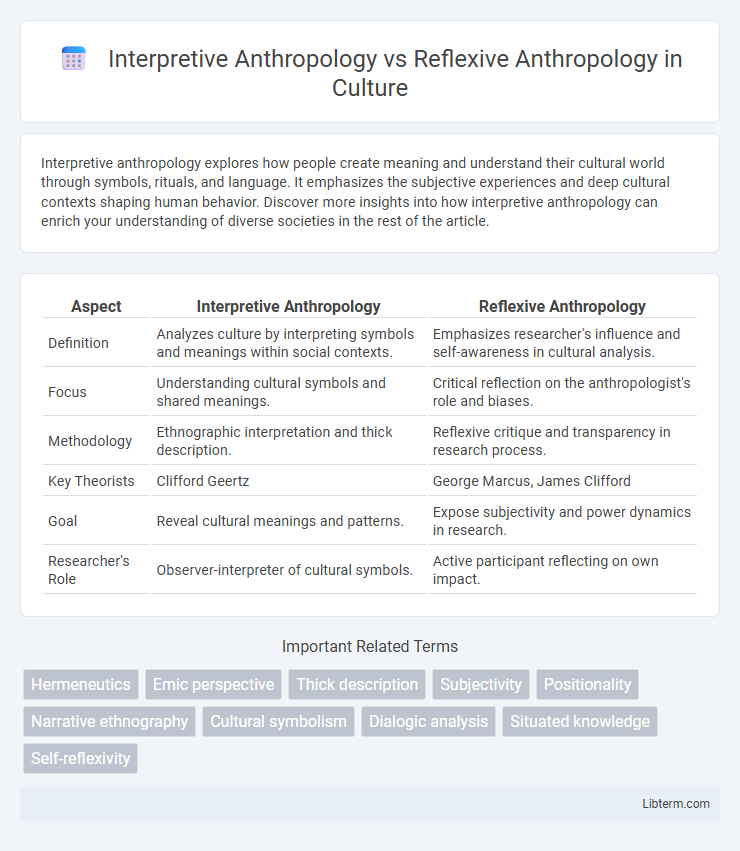Interpretive anthropology explores how people create meaning and understand their cultural world through symbols, rituals, and language. It emphasizes the subjective experiences and deep cultural contexts shaping human behavior. Discover more insights into how interpretive anthropology can enrich your understanding of diverse societies in the rest of the article.
Table of Comparison
| Aspect | Interpretive Anthropology | Reflexive Anthropology |
|---|---|---|
| Definition | Analyzes culture by interpreting symbols and meanings within social contexts. | Emphasizes researcher's influence and self-awareness in cultural analysis. |
| Focus | Understanding cultural symbols and shared meanings. | Critical reflection on the anthropologist's role and biases. |
| Methodology | Ethnographic interpretation and thick description. | Reflexive critique and transparency in research process. |
| Key Theorists | Clifford Geertz | George Marcus, James Clifford |
| Goal | Reveal cultural meanings and patterns. | Expose subjectivity and power dynamics in research. |
| Researcher's Role | Observer-interpreter of cultural symbols. | Active participant reflecting on own impact. |
Introduction to Interpretive and Reflexive Anthropology
Interpretive anthropology centers on understanding cultures by analyzing symbolic meanings and cultural texts through thick description. Reflexive anthropology critiques the researcher's influence on knowledge production, emphasizing self-awareness and the positionality of the anthropologist within the fieldwork context. Both approaches challenge positivist methodologies by prioritizing subjective interpretation and the dynamics between observer and observed in ethnographic studies.
Defining Interpretive Anthropology
Interpretive Anthropology centers on understanding cultures by analyzing symbols, meanings, and practices through the perspective of the people being studied, emphasizing cultural context and subjective experience. It was pioneered by Clifford Geertz, who argued that culture is a system of inherited conceptions expressed in symbolic forms. Reflexive Anthropology critiques and reflects on the anthropologist's own role and biases within the research process, contrasting with Interpretive Anthropology's focus on the insider's viewpoint.
Core Principles of Reflexive Anthropology
Reflexive anthropology centers on the critical examination of the anthropologist's own influence on research, emphasizing the subjectivity and positionality of the observer within the fieldwork context. It challenges the notion of objective observation, advocating for transparency about the researcher's biases and the co-constructed nature of ethnographic knowledge. Core principles include self-awareness, ethical accountability, and the acknowledgment that cultural interpretations are shaped as much by the anthropologist as by the subjects studied.
Historical Development of Both Approaches
Interpretive anthropology emerged in the 1970s, primarily influenced by Clifford Geertz's focus on understanding cultures through thick description and symbolic meanings. Reflexive anthropology developed later as a critique, emphasizing the anthropologist's role in shaping ethnographic knowledge and arguing for greater self-awareness and transparency in research methods. Both approaches evolved as responses to earlier positivist traditions, reshaping ethnographic practice through different emphases on subjective interpretation and researcher positionality.
Key Theorists: Geertz vs. Bourdieu & Others
Interpretive Anthropology, championed by Clifford Geertz, emphasizes understanding cultures through thick description, focusing on symbolic meanings and how individuals interpret their social world. Reflexive Anthropology, advanced by Pierre Bourdieu and other theorists like Margaret Mead, critiques the researcher's positionality and incorporates self-reflection to uncover power dynamics and the influence of social structures on cultural practices. While Geertz centers on meaning-making, Bourdieu's framework investigates habitus, capital, and field, highlighting the interplay between agency and structural constraints.
Methodological Differences in Fieldwork
Interpretive Anthropology emphasizes understanding cultural symbols and meanings through detailed participant observation and ethnographic description, prioritizing the insider's perspective. Reflexive Anthropology incorporates the anthropologist's self-awareness and positionality, critically examining how their presence and biases influence data collection and interpretation. Methodologically, Interpretive Anthropology relies on thick description, while Reflexive Anthropology employs continuous self-reflection and dialogue to address subjectivity in fieldwork.
The Role of the Anthropologist: Interpreter vs. Reflexive Participant
Interpretive anthropology positions the anthropologist as an interpreter who deciphers cultural symbols and meanings within social contexts, emphasizing the understanding of native perspectives. Reflexive anthropology redefines this role by insisting the anthropologist actively examines their own influence, biases, and interactions as part of the research process, thus becoming a reflexive participant in the cultural narrative. The contrast highlights a shift from objective interpretation towards a critical self-awareness that shapes both knowledge production and ethnographic representation.
Criticisms and Limitations of Each Approach
Interpretive anthropology faces criticism for its tendency to overemphasize cultural meanings at the expense of material and structural factors, potentially leading to subjective interpretations detached from social realities. Reflexive anthropology is limited by its intense self-scrutiny, which can result in excessive focus on the anthropologist's positionality, sometimes overshadowing the studied culture and reducing analytical objectivity. Both approaches grapple with balancing the depth of cultural insight against the risk of relativism or researcher bias, challenging the production of universally valid knowledge.
Contemporary Applications in Anthropological Studies
Interpretive anthropology emphasizes understanding cultures through the symbols and meanings that people use to make sense of their world, heavily influencing ethnographic methods in contemporary cultural analysis. Reflexive anthropology prioritizes critical self-awareness of the anthropologist's positionality and the power dynamics inherent in research, shaping ethical approaches and collaborative practices in modern fieldwork. Current anthropological studies integrate both perspectives to produce nuanced insights that address cultural complexity while acknowledging researcher influence.
Conclusion: Bridging Interpretive and Reflexive Perspectives
Interpretive anthropology emphasizes understanding cultural meanings through participant observation and thick description, while reflexive anthropology critiques the researcher's positionality and acknowledges inherent biases in ethnographic work. Bridging these perspectives enhances anthropological analysis by combining deep cultural interpretation with ongoing self-awareness and methodological transparency. Integrating interpretive depth and reflexive critique fosters more nuanced, ethical, and reliable representations of diverse human experiences.
Interpretive Anthropology Infographic

 libterm.com
libterm.com